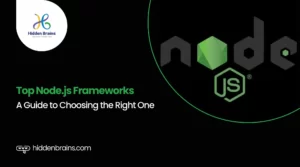Summary
The blog highlights the rising popularity of Node.js frameworks that power scalable, high-performance web applications used by giants like Netflix and Uber. It lists top frameworks, including Express.js, Koa.js, Meteor.js, Socket.io, and Nest.js, noting their strengths in backend development, real-time features, modularity, and scalability. The guide explains how these frameworks accelerate development and suit different project needs while offering practical tips to choose the best fit for your app’s requirements.
The rising demand for Node.js Frameworks has been recognized with the success rate of apps like Walmart, Uber, Netflix, PayPal, and more which has set the benchmark in the industry by delivering unmatched user experience.
Though these apps have been long back introduced in the market, the scalability of these apps was recognized during COVID-19 with the sudden shooting number of users. These apps have rapidly scaled up without showing any downtime and keep the users engaged with the app longer.
Looking at this rising demand for these apps, developers and businesses have started testing various frameworks that offer advanced features to build the app like Netflix, Walmart, and more web apps.
But one thing that you missed notice here is that Node.js frameworks power these. According to the survey report, 4 out of 5 backend and full-stack developers rate Node.js frameworks as their prime choice for app development.
In fact, with around 50,000 open source packages available through NPM (Node Package Manager) Node.js ensures hassle-free backend extension.
Furthermore, the GitHub repository has 99k Stars and 27.5k Forks conveying that Node.js has an active community.
As its popularity is growing, there are several Node.js frameworks out there to try. However, some outperformers offer excellent community support, performance, and ease of use. So which one do you need to use to create a web app?
In this blog, we have listed some of the top Node.js Frameworks that offer even real-time features to Node.js applications. But different apps have different requirements!
Are you looking to build a web app like Netflix with excellent backend power? Explore our Node.js development services to customize your app’s robust backend and ensure seamless performance.
Before you get started with the Node.js development services, let’s start with the basics…
What are the Primary Uses of Node.js Frameworks?

Source: Twitter
Wondering why you need to look for Node.js Frameworks when there are various traditional approaches available to create a powerful backend?
Well, the inspiration for looking to hire Node.js developers in USA comes from the seamless performance of apps like Netflix, Walmart, and more. But before you get started with Node.js, let’s learn about the primary uses of Node.js frameworks revolve around their ability to streamline web application development and address specific needs efficiently:
Accelerated Development: Node.js frameworks expedite development processes, ideal for meeting tight deadlines or creating prototypes swiftly.
Code Organization: These frameworks enforce structured code organization, enhancing readability, maintainability, and collaboration on projects.
Pre-built Functionality: Node.js frameworks offer a range of built-in features such as routing, authentication, and database access, reducing development time and complexity.
Real-time Capabilities: Leveraging Node.js’ prowess in handling real-time data, frameworks are adept at powering features like live chat or collaborative editing in applications.
APIs and Microservices: Node.js frameworks are well-suited for constructing APIs and microservices, delivering lightweight yet scalable solutions for modern architectures.
Community Support: Supported by vibrant communities, popular Node.js frameworks provide abundant resources, tutorials, and assistance, facilitating smoother development journeys and problem-solving.
So what type of Node.js frameworks do you need to choose for the app development? Let’s jump straight on the list of top Node.js frameworks for backend development.
Top Choice of Node.js Frameworks for App Development in 2025
If you are all set to kickstart your app development process and looking for the best choice of Node.js frameworks, then here is a list that you can consider in 2025. Let’s get started with the details:
1. Express.js
A fast, unopinionated, minimalist web framework for Node.js, Express.js is specially designed to build single-page web applications and APIs. Described as a Sinatra-inspired server by the original TJ Holowaychuk, ExpressJS is relatively minimal with many features available as plugins. Express is the backend component of the MEAN stack.
Often dubbed as a de facto standard server framework for Node.js, it is fast and helps in directing servers and routers. Express comes across as the most feasible option for businesses wanting to build a product quickly and without legacy code.
- Support for plugins and extensions
- Several popular Node.js frameworks are built on Express
- HTTP utility methods and middleware to create a robust API quickly
- Set of features for web and mobile applications
When It Express.js Can Be Used?
- Support Web Apps: Perfect for building simple or complex web apps with multiple routes and views.
- Single Page Apps: Express.js handles backend tasks for SPAs, managing API requests and serving static assets.
- Real-time Apps: Pair Express.js with libraries like Socket.IO for building chat apps or live dashboards.
Top Companies Using Express.js
- Uber: Uber uses Express.js in its backend services to handle requests from users and drivers, as well as manage data and communications.
- Netflix: Netflix employs Express.js for building and maintaining parts of its backend infrastructure, facilitating smooth content delivery and user experience.
- LinkedIn: Uses Express.js for its backend system to power features like messaging, notifications, and content delivery.

2. Koa.js
Koa.js is designed by the Express.js team and used as a web framework that aspires to become a smaller, yet expressive way to build a strong foundation for web applications and APIs. Async functions significantly improve error handling. It makes it easy to manage various types of content such as personalizing content, managing several formats for images, and much more.
Key Highlights Kao.js
- In-depth app customization
- Availability of ES6 Generator to avoid callbacks
- Lightweight structure to ramp up the app performance
- A modular approach to developing complex web applications
When It Koa.js Can Be Used?
- Building Web Applications: Koa.js is utilized for developing web applications and APIs with Node.js.
- Middleware Handling: It excels in managing middleware, providing a streamlined approach for handling HTTP requests and responses.
- Control Flow: Koa.js offers better control flow mechanisms, allowing developers to manage asynchronous operations more efficiently.
- Minimalism: Known for its minimalist design, Koa.js promotes cleaner and more concise code compared to other frameworks.
Top Companies Using Koa.js
- Alibaba: The e-commerce giant has utilized Koa.js in various parts of its infrastructure.
- Netflix: While primarily known for using Node.js, Netflix may use Koa.js in specific microservices or backend components
3. Meteor.js
Being trusted by more than 500k developers and industry giants, Meteor is a mature open-source web framework to build and scale efficiently. It is written in Node.js, Meteor provides rapid prototyping and cross-platform code (using Android, iOS, and Web). Meteor allows developing features instead of configuring disparate components.
Keyhights of Meteor.js
- Automatically propagate data changes
- Code support for different devices
- Less requirement of coding web and mobile applications
- Easy to integrate with Angular, React, Vue, and more
- Lightweight architecture
When It Meteor.js Can Be Used?
- Real-time web applications: Ideal for instant updates and interactions like chat apps and live dashboards.
- Rapid prototyping: Enables quick testing of concepts and features.
- Full–stack development: Handles both client-side and server-side aspects without additional frameworks.
- Single–page applications (SPAs): Supports dynamic interactions without full page reloads.
- Cross-platform development: Builds desktop and mobile apps using web technologies.
Top Companies Using Meteor.js
- Slack: Slack uses Meteor.js for real-time communication among teams.
- Honeywell: They use Meteor.js for building applications related to home automation and control systems.
- Accenture: Has employed Meteor.js for developing collaborative software solutions for its clients.
4. Socket.io
Socket.io is a JavaScript library for real-time web applications. It allows real-time, bi-directional communication between web clients and servers. It is event-driven just like Node.js. It provides many more features, including broadcasting to multiple sockets, storing data associated with each client, and asynchronous I/O.
Key Highlights of Socket.io
- Provides event-based and real-time communication
- Send data to clients as real-time counters, charts, or logs
- Works on any platform, browser, or device
- Allow users to concurrently edit a document and see each other’s changes
When It Socket.io Can Be Used?
- Chat Applications: Socket.io facilitates instant messaging without page refresh.
- Real-Time Collaboration Tools: Enables multiple users to see simultaneous updates on collaborative platforms.
- Live Updates: Supports real-time information dissemination like sports scores or stock market changes.
- Gaming: Powers real-time communication between players and game servers in multiplayer games.
- IoT (Internet of Things): Enables real-time control and monitoring of IoT devices.
Top Companies Using Socket.io
- Microsoft: Utilized in various Microsoft products and services for real-time communication.
- Trello: Implements Socket.io for real-time updates and collaboration features.
5. Nest.js
Nest.js is a progressive Node.js framework used to create secure and scalable server-side applications. Enterprises can choose to hire web app developers to build enterprise-grade applications using the powerful features of Nest.js. With its architecture inspired by Angular, Nest provides application architecture to create highly testable and easily maintainable applications.
Key Highlights of Nest.js
- Supports TypeScript and OOP elements (Object-Oriented Programming), FP (Functional Programming), and FRP (Functional Reactive Programming)
- Modular architecture gives the flexibility to use any other libraries
- Adaptable ecosystem providing fundamental support for all kinds of server-side applications
- JavaScript features to offer robust and mature solutions to the Node.js community
- External libraries due to systematic code arrangement
When It Nest.js Can Be Used?
- Microservices: Nest.js excels in building microservices with its modular structure and support for microservice patterns.
- Real-time Applications: Thanks to WebSocket support and event-driven architecture, it’s great for real-time apps like chats or live tracking.
- API Development: Nest.js simplifies API development with decorators and dependency injection, ideal for RESTful or GraphQL APIs.
- Enterprise Applications: Nest.js is an ideal option for building large-scale apps With features like dependency injection and middleware support.
- Prototyping and MVPs: Nest.js is handy for quick prototyping and MVP development due to its productivity features and easy project scaffolding.
Top Companies Using Nest.js
- Nest.js: The creators of Nest.js themselves use their framework for various projects and actively contribute to its development.
- Cloudoki: It’s a leading consultancy and development agency, Cloudoki has employed Nest.js in building applications for its clients.

Ready to step into the future?
Let Hidden Brains enable NestJS in the next project!The list is never-ending, but here we have listed the top choice of Node.js Frameworks that are being trusted by industry giants and well-tested for performance. Now how will you decide what framework best suits your project needs?
Read More: 8+ Top Node.js Development Trends and Predictions in 2025
How To Choose the Best Node.js Framework for Your App Development Project?
Though there are several Node.js frameworks out there choosing the best one that perfectly aligns with your project requirements is one of the most complicated decisions. So here are the few parameters that you can consider to easily narrow down the options:
Application Type: Before you start browsing the list of Node.js frameworks, it is worth understanding your project requirements. Determine whether it is a blog, e-commerce store, real-time app, or API server, different frameworks excel in different types of applications.
Team Skills: Look out for the app development team with JavaScript proficiency. Choose a framework that aligns with your team’s expertise.
Performance Requirements: Evaluate the expected request volumes per second and desired response times. Select a framework that can handle the anticipated load efficiently.
Scalability Plans: Consider the growth stages of your user base over time and select the framework that offers scalability and can accommodate increasing traffic and user demand.
Application Complexity: Determine the complexity of your application, whether it’s a simple Minimum Viable Product (MVP) or involves extensive business logic. Select a framework that suits your project’s complexity.
Security Needs: Identify the level and type of security vulnerabilities your application may encounter. Choose a framework that provides robust security features and allows for easy implementation of security measures.
Codebase Reusability: Assess whether you need to integrate legacy code written in a specific platform. Choose a framework that facilitates codebase reuse and seamless integration with existing systems.
Read More: Tips To Hire Node.js Developers in 2025
FAQs
If you are still in doubt about using Node.js frameworks, then consider this FAQ section to get all the questions answered related to the Node.js frameworks.
What are the Top Node.js Frameworks for Backend Development?
Whether it’s a small app or a big enterprise one, a strong backend is crucial for flawless performance. So the top choice of Node.js frameworks you can consider are:
– Express.js
– Koa.js
– NestJS
– Sails.js
– Hapi.js
How Does a Node.js Development Company Contribute to Project Success?
Hiring a Node.js development company for enterprise-grade app projects is a smart move. They bring industry expertise, resources, and experience to the table, ensuring project success. These companies are reliable, stick to timelines, and can deploy dedicated teams for seamless app development.
What Distinguishes Node.js Frameworks from Traditional Web Development Frameworks?
Node.js serves as a runtime environment, facilitating the execution of server-side JavaScript. Complementing this, Node.js frameworks such as Express.js provide developers with pre-built structures, simplifying the creation of robust web servers, APIs, and microservices.
What Type of Apps Can You Develop Using Node.js Frameworks?
Node.js frameworks are versatile and can be used to develop various types of applications, including:
– It is a perfect option for building anything from simple websites to complex web apps with multiple routes and views.
– Node.js frameworks excel in creating APIs facilitating communication between different systems and enabling integration with third-party services.
– Node.js can be a wonderful choice for developing Real-Time apps. It’s asynchronous and event-driven nature makes it ideal for real-time apps like chat, gaming servers, and live streaming platforms.
Conclusion
This guide offers clear insights into Node.js and its leading frameworks, but hiring a mobile app developer in USA remains the real challenge. The ideal framework depends on your application type, goals, and technical requirements. Careful evaluation is essential to ensure scalability and performance. Partnering with an experienced Node.js development company simplifies this process. With 22+ years of experience, 6000+ successful projects, and 700+ skilled engineers, Hidden Brains helps businesses select the right framework and build powerful, future-ready Node.js applications.































































































![Sales & Distribution [Oil & Gas] Sales & Distribution [Oil & Gas]](https://www.hiddenbrains.com/blog/wp-content/themes/blankslate/assets/images/sales_and_distribution-icon.74d08193.svg)

![Fluid Terminal Management [Oil & Gas] Fluid Terminal Management [Oil & Gas]](https://www.hiddenbrains.com/blog/wp-content/themes/blankslate/assets/images/fluid_terminal_management-icon.4b3a27a4.svg)































![Sales & Distribution [Oil & Gas] Sales & Distribution [Oil & Gas]](https://www.hiddenbrains.com/blog/wp-content/themes/blankslate/assets/images/sales_and_distribution-icon.74d08193.svg?1.0.0)
![Fluid Terminal Management [Oil & Gas] Fluid Terminal Management [Oil & Gas]](https://www.hiddenbrains.com/blog/wp-content/themes/blankslate/assets/images/fluid_terminal_management-icon.4b3a27a4.svg?1.0.0)
























































































































































































